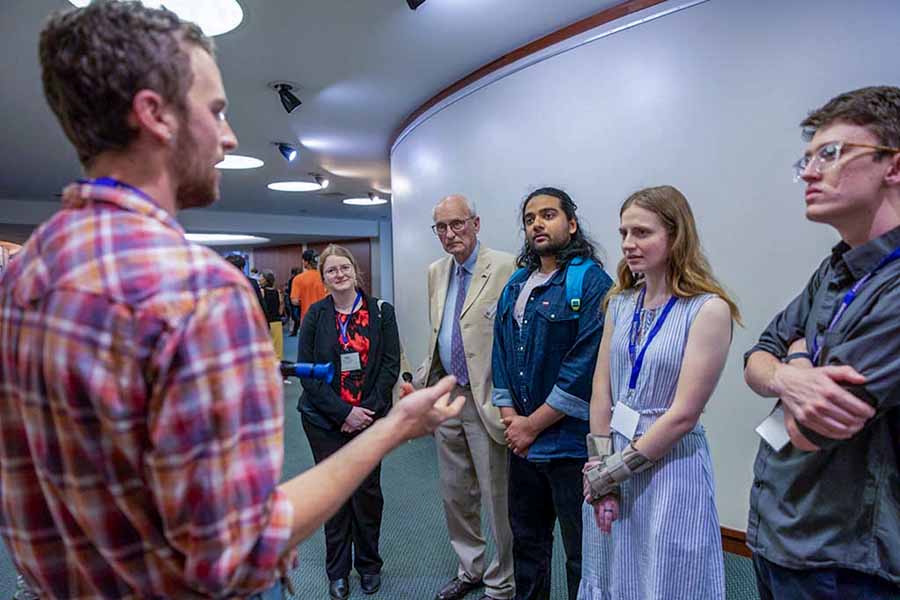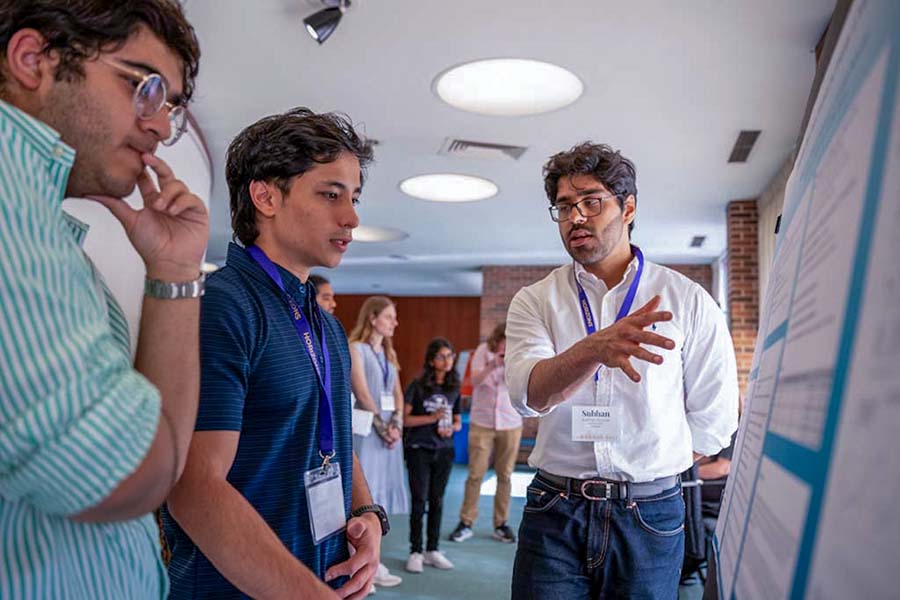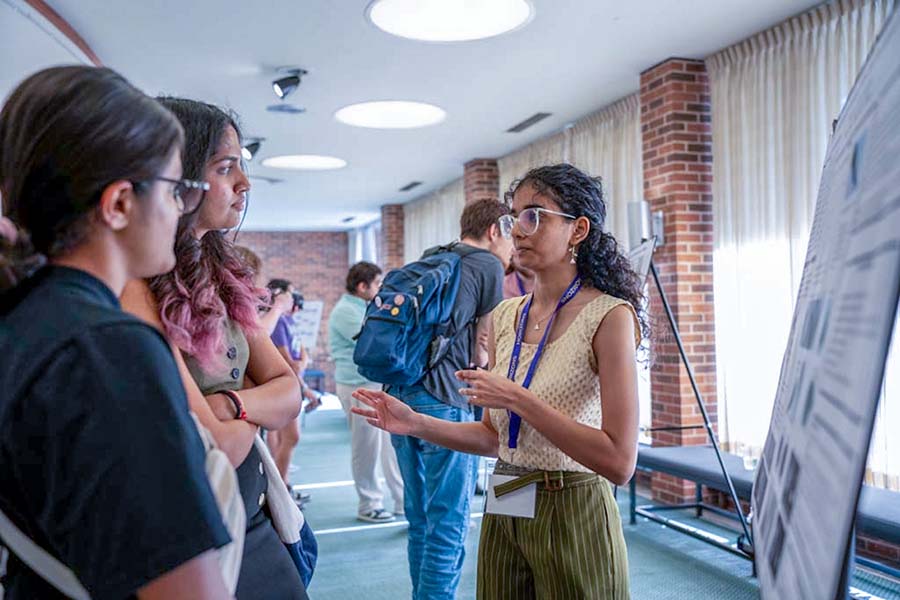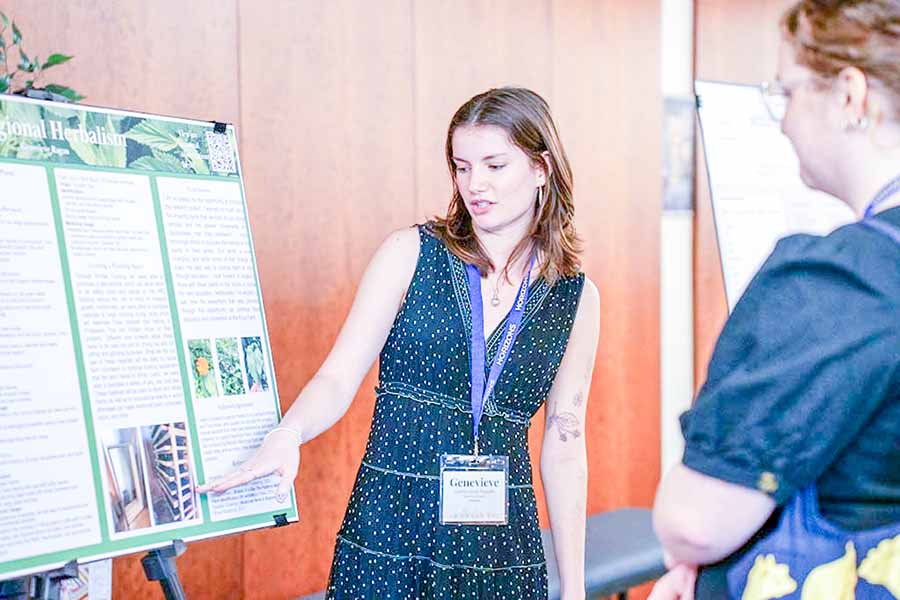Knox Stories
Michael Takeo Magruder Named First Knight Fund Distinguished Artist-in-Residence
Knox College will host its first-ever Knight Fund Distinguished Artist-in-Residence, Michael Takeo Magruder, from September 16 to September 30, 2025
Venture Boldly

Office of Communications
2 East South Street
Galesburg, IL 61401


Knox College hosted its HORIZONS Research Symposium on Friday, May 16, showcasing the program's remarkable growth and popularity.
The diverse range of projects and presentations allowed for events to be spread across campus, covering a variety of research topics. The event featured an opening reception in the Alumni Hall Atrium, followed by poster presentations in the Ford Center for the Fine Arts lobby.
Director of the Vovis Center for Research and Advanced Study and Health Professions Advising, Lisa Harris, expressed her excitement about the program's evolution, remarking on how it has expanded from a small gathering to a significant event with 51 poster presentations—double the number from the previous year—alongside 71 student presenters engaging in oral presentations.
“It’s been awesome to see HORIZONS grow so much over the last five years. Before, HORIZONS was in one room and there were about 15 to 25 student presenters,” Harris said. “Now, this HORIZONS event makes it clear that on campus these days, it’s not hard to find a student who interacts with the Vovis Center. We love that—that’s what we want. We want students taking on these interesting projects, from academic year classroom projects to honors study, to regional and national conference presentations.”

The symposium has been a staple at Knox since 2012, highlighting the academic accomplishments of students through a variety of advanced studies, including the honors program and collaborations with faculty mentors.
President C. Andrew McGadney expressed his gratitude for the event, portraying it as one of his favorite moments of the academic year.
“I can’t tell you how excited I am to see so many of you here today,” President McGadney said during the opening reception. “As we get closer to the end of the year, there are moments I treasure and this is one of them.”
Support from Knox faculty plays a crucial role in the success of these projects, with mentorship provided inside and outside the classroom. The Vovis Center helps bring the projects to life, supplying grants to support both the students and materials that may be needed. The Richter Memorial Fund works with the Vovis Center to provide funding for much of the research that make the projects possible. Both Trustee Emeritus Gerald Vovis ’65 and his wife, Carol Klail Vovis ’65, who established the Vovis Center, were on hand for this year's symposium.
“Every year I come to this event, I think long and hard about mentoring,” Knox College Provost Michael Schneider said. “I know I’ve had many mentors who have supported me, I’ve been in a mentorship role helping with the presentations, and having been provost for the last seven years, this is my last HORIZONS so it’s an emotional night, especially with where we are today. I appreciate the opportunity to reflect on this so much.”

The Richter Memorial Fund is instrumental in facilitating HORIZONS by funding students' creative pursuits. The size and scope of HORIZONS would not be what it is today without the generosity of the Richter Memorial Fund, which supports students’ scholarly and creative pursuits. Tim Quinn from Bank of America represented the Richter Memorial Fund support during the event.
“We’re lucky, and I’m grateful for the Richter Memorial Fund, which makes it possible for students to try something new, dig a little deeper, and be changed in the process,” Harris said. “The growth you see in this event over the last few years would not be possible without the Richter Memorial Fund. Since 2020, we’ve received 1.1 million dollars from the Richter Memorial Fund. Thank you to Tim Quinn of Bank of America for making all of this possible.”
Students shared their research and creative experiences through their posters and presentations. For instance, studio art major Eli Mueller ’25, created an installation that reflects his passion for art and biology, supported by a grant from the Richter Memorial Fund.

“We end the year with a big art show and I wanted to create an installation piece that connects my passions of art with biology,” Mueller said. “I grew up and lived by the Mississippi River my whole life, so I’m a big fan of fish, reptiles, and animal forms that would be fun to translate into art. Thanks to the Richter Fund, I received a grant that helped me purchase materials like wood, installation foam, chicken wire, clay, and a lot of sculptural materials and worked on creating this replica fish market stall. ”
Anirudh Madarapu's ’26 project focused on reinforcement learning with a controlled robotic arm and illustrated how his work could lead to practical applications in AI, enhancing everyday tasks.
“I want to continue to explore reinforcement learning, currently I’m exploring different kinds of AI,” Madarapu, whose HORIZONS project was called “Reinforcement Learning on a Controlled Robotic Arm,” said. “I’m starting here at HORIZONS, then onto something like Chat GPT, but for shopping. For example: I’m into fitness and say I have an allergy to an ingredient in a specific protein bar. AI knows all the details, so it can create a list to prevent me from buying those products.”
Following the poster presentations, oral presentations were held across various campus locations, featuring faculty-moderated discussions that allowed for in-depth Q&A sessions.
The symposium brought together a wealth of student work supported by various funds and programs, highlighting the collaborative efforts of all involved and the acknowledgements made to those who contributed to the event’s success.
The work done by students and presented at HORIZONS would not have been possible without the various grants, endowed funds, fellowships, and academic achievement programs that supported the projects.
A special acknowledgment was made to the following groups for their efforts and support:
Richter Memorial Fund, Artists, Scholars, Scientists, and Entrepreneurs of Tomorrow Program, Andrew W. Mellon Foundation’s “Abolition for All Time” Humanities Lab, Ronald E. McNair Post-Baccalaureate Achievement Program, Knauss Student Research Fund for the Lincoln Studies Center, Mogbo Endowed Sustainability Fund, Lizzy Warner Fund for Women in STEM, Knight Fund for the Study of Religion and Culture, Baker Velde Student Research Award, William Fern Prize, Steve Floyd Memorial Fund, Laszlo J. Nemeth Memorial Research Award, Charles and Arvilla Timme Fellowship Award, David D. Arnold Research Award, Knox College of Experience Grant, and the mentorship provided by Knox College faculty.
Published on May 30, 2025
Scott Holland, Office of Communications